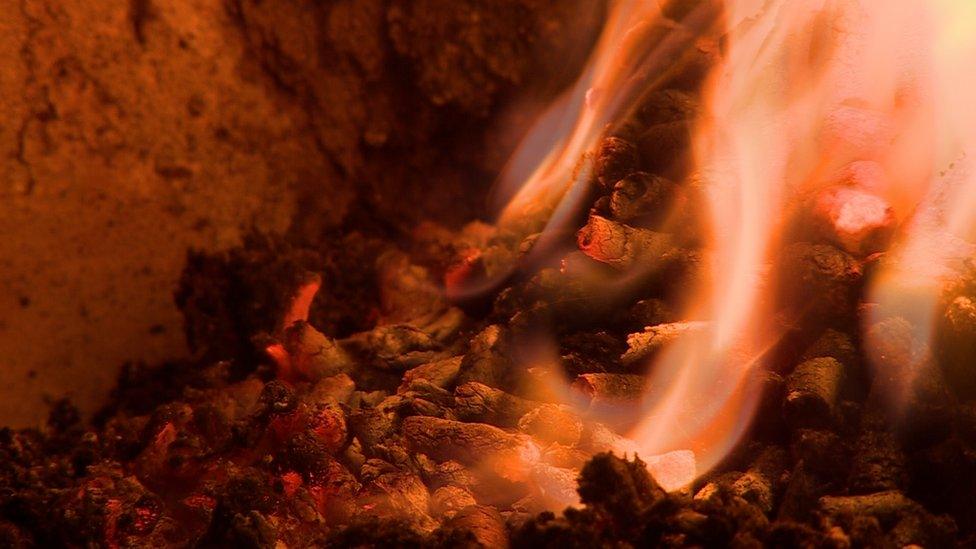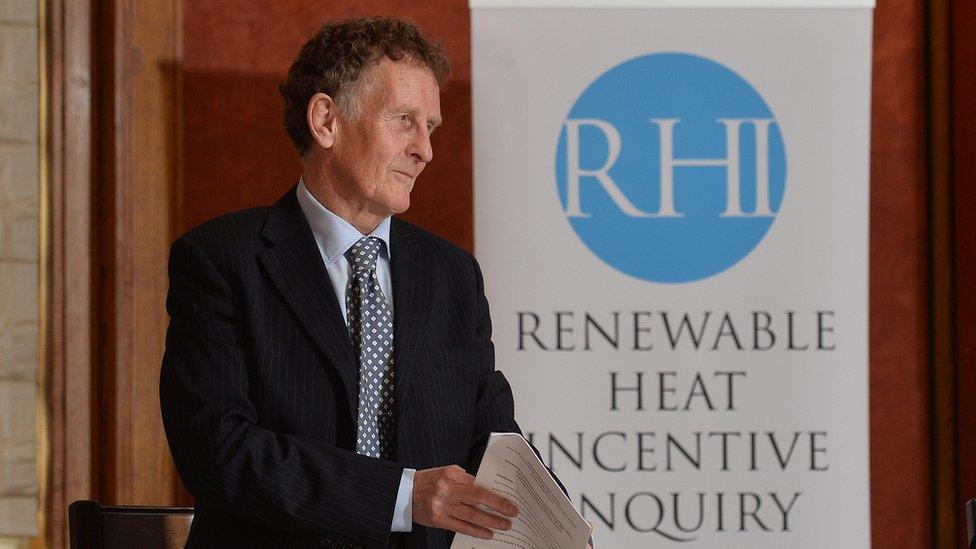RHI Inquiry: Budget experts 'didn't grasp' cash-for-ash finances’
- Published

The RHI scheme brought Stormont's institutions to collapse in January 2017
Stormont finance specialists did not fully understand the budget plan for a flawed energy scheme before its costs spiralled, a civil servant has said.
Senior finance department official Mike Brennan said various things had gone wrong in the planning stages of the Renewable heat Incentive (RHI) scheme.
Combined, they created "the horror that we've seen", he told the RHI Inquiry.
There was no grasp the scheme's potential to "critically undermine" Northern Ireland's budget, he said.
The inquiry, which is taking place at Stormont, was set up to investigate the circumstances surrounding the energy initiative, after its costs spiralled.
The RHI scheme offered to subsidise the cost of its claimants' fuel - mostly wood pellets - for running their heating systems.
But the fuel actually cost far less than the subsidy they were receiving, effectively meaning that users could earn more money by burning more fuel.
The most recent estimate put the projected overspend at £700m over 20 years if measures to control the cost are not implemented.
The scandal generated significant public concern and the fallout surrounding it led to the collapse of Northern Ireland's devolved administration and a major political crisis that exists to this day.

Sir Patrick Coghlin is chairing the RHI Inquiry, which is expected to last for several months
Mr Brennan, a former head of the finance department's expenditure division, appeared before the inquiry on Wednesday.
He accepted that there were differing interpretations among finance officials of an email from the Treasury that laid out the implications of an overspend.
They had never been formally told how the finance arrangements would work, but they also did not seek clarification on the issue, he said.
That, and the fact that Stormont's enterprise department (DETI) had little experience of running such a scheme, contributed to a "cocktail of a perfect storm".
Earlier, a retired civil servant said she had given clear warnings of the danger of an overspend.
Bernie Brankin, who worked in the finance section of DETI, said she told a number of senior officials in her department that there would have to cost controls built into the scheme.
She described a Treasury email setting out the conditions as a "warning shot".
In her witness statement, she said she assumed they had been included but realised four years later that they were missing, by which stage the scheme had run into major financial trouble.
A previous DETI grant scheme had also run into trouble, she said, but not to the same scale.
Ms Brankin told an internal investigation into the RHI scheme's problems that she had "never seen anything like this, apart from their last scheme".
Junior counsel to the inquiry Joseph Aiken said one reading of that statement was: "I've never seen a mess like this since the one they made the last time."
It has also emerged that a second whistleblower raised concerns with officials running the scheme about allegations of its misuse.
Renewables company Solmatix wrote to DETI to highlight problems with the scheme.
The inquiry had heard that only Janette O'Hagan, who ran an energy efficiency business, had flagged such issues after becoming concerned by what she had seen.
But the department has now said it has found correspondence with Solmatix that also pointed to abuse of the scheme.
In documents placed on the RHI Inquiry website, the department said the company had told it about "unscrupulous beneficiaries".
It has emerged that Solmatix told officials that such people were "not only taking advantage" of the initiative, but "in many cases, notably within the poultry sector, appear to be actively exploiting it".
It is not yet clear when the department received the communication or what, if anything, was done about it.
The inquiry has already heard that Janette O'Hagan's warnings were ignored.
The department said it had also examined other material sent to the inquiry that has added to its understanding of what went wrong.
On the question of "information and interactions" with the renewables industry, the department said it had seen new evidence which added to its concern that there had been a "conspiracy of silence" about the scheme's problems.
- Published7 November 2017

- Published23 October 2019

- Published5 December 2017
